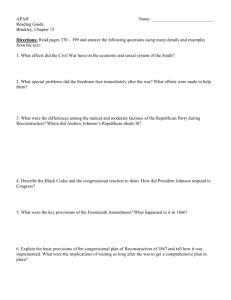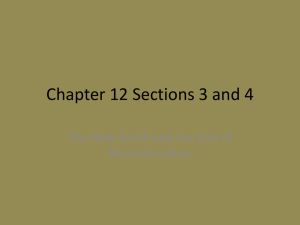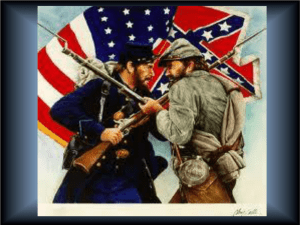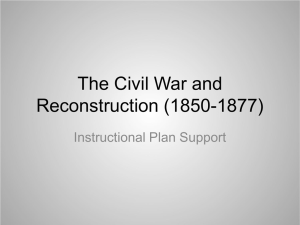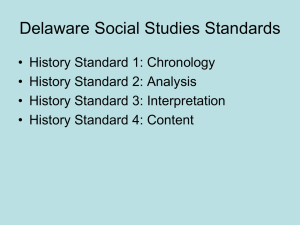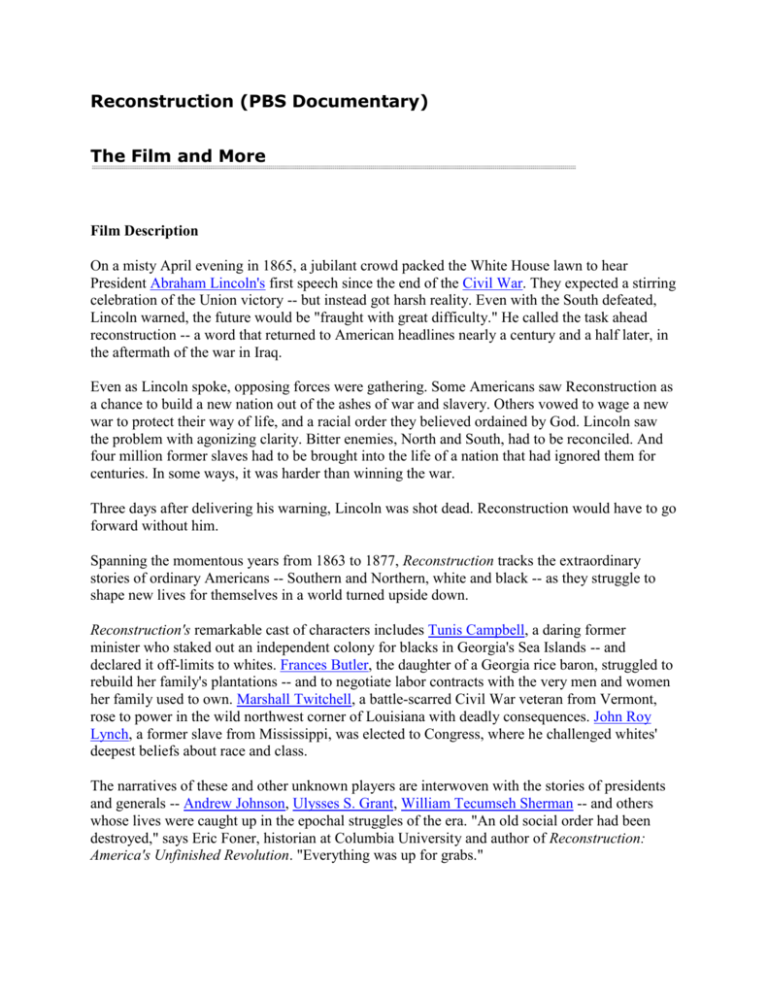
Reconstruction (PBS Documentary)
The Film and More
Film Description
On a misty April evening in 1865, a jubilant crowd packed the White House lawn to hear
President Abraham Lincoln's first speech since the end of the Civil War. They expected a stirring
celebration of the Union victory -- but instead got harsh reality. Even with the South defeated,
Lincoln warned, the future would be "fraught with great difficulty." He called the task ahead
reconstruction -- a word that returned to American headlines nearly a century and a half later, in
the aftermath of the war in Iraq.
Even as Lincoln spoke, opposing forces were gathering. Some Americans saw Reconstruction as
a chance to build a new nation out of the ashes of war and slavery. Others vowed to wage a new
war to protect their way of life, and a racial order they believed ordained by God. Lincoln saw
the problem with agonizing clarity. Bitter enemies, North and South, had to be reconciled. And
four million former slaves had to be brought into the life of a nation that had ignored them for
centuries. In some ways, it was harder than winning the war.
Three days after delivering his warning, Lincoln was shot dead. Reconstruction would have to go
forward without him.
Spanning the momentous years from 1863 to 1877, Reconstruction tracks the extraordinary
stories of ordinary Americans -- Southern and Northern, white and black -- as they struggle to
shape new lives for themselves in a world turned upside down.
Reconstruction's remarkable cast of characters includes Tunis Campbell, a daring former
minister who staked out an independent colony for blacks in Georgia's Sea Islands -- and
declared it off-limits to whites. Frances Butler, the daughter of a Georgia rice baron, struggled to
rebuild her family's plantations -- and to negotiate labor contracts with the very men and women
her family used to own. Marshall Twitchell, a battle-scarred Civil War veteran from Vermont,
rose to power in the wild northwest corner of Louisiana with deadly consequences. John Roy
Lynch, a former slave from Mississippi, was elected to Congress, where he challenged whites'
deepest beliefs about race and class.
The narratives of these and other unknown players are interwoven with the stories of presidents
and generals -- Andrew Johnson, Ulysses S. Grant, William Tecumseh Sherman -- and others
whose lives were caught up in the epochal struggles of the era. "An old social order had been
destroyed," says Eric Foner, historian at Columbia University and author of Reconstruction:
America's Unfinished Revolution. "Everything was up for grabs."
After four bloody years of civil war, North and South would continue to fight over the meaning
of freedom, the meaning of citizenship, and the survival of the nation itself. Reconstruction
brings to life this turbulent and complex period through original footage shot on location,
primarily in the South (Alabama, Georgia, Louisiana, North Carolina), and with the assistance of
regional groups and associations -- the First Louisiana Cavalry Regiment, Company E; the
Liberty Greys, Civil War re-enactors based in New England; South Carolina's Gullah/Geechee
Sea Island Coalition; and the Thirty-Second Georgia Artillery, among others.
Reconstruction shows how, in just a few years, a series of stunning events -- the Emancipation
Proclamation, the Fourteenth Amendment granting ex-slaves citizenship in 1868, the
enfranchisement of blacks the following year -- reversed centuries-old patterns of race relations
in America. People who for generations had been the property of others were now free to run
their own lives.
The whole Southern world was turned upside down. And yet, despite these challenges and
terrible racial violence in this period, so much was accomplished. Reconstruction brought public
schools to the South for the first time. Black Southerners were elected to local and national
offices. And the nation committed itself to equality under the law for all Americans, regardless
of race, by passing the Fourteenth Amendment. Reconstruction laid the groundwork for the civil
rights movement of the 1950s and 60s, and the foundation for the American society we live in
today.
For Further Reading
This page presents a general bibliography for Reconstruction. For books and Web sites related to
specific topics including sharecroppers, education, black suffrage and political participation,
carpetbaggers, and more, please refer to the Further Reading pages accessible from the topical
sections of this site.
Web sites
Library of Congress: African American Odyssey
http://memory.loc.gov/ammem/aaohtml/aohome.html
The Library of Congress's American Memory Web site includes this special exhibit tracing
African American history and the quest for full citizenship. It includes a section on
Reconstruction that provides links to original documents.
Documenting the American South
http://docsouth.unc.edu/
The University of North Carolina-Chapel Hill's Documenting the American South archive has
collected and published online over 1200 sources on Southern history, literature and culture,
including dozens of first-person accounts of the Civil War and Reconstruction. A subject index
provides useful access to the collection.
America's Reconstruction: People and Politics After the Civil War
http://www.digitalhistory.uh.edu/reconstruction/index.html
The Digital History Web site, a collaboration between the University of Houston, the Gilder
Lehrman Institute of American History, and other institutions, presents an online version of Eric
Foner and Olivia Mahoney's exhibit on Reconstruction.
Africans in America
http://www.pbs.org/wgbh/aia/home.html
Companion site to a PBS documentary on America's journey through slavery, this site provides
ample primary sources, historian interviews and other resources for learning about slavery from
first settlement through the Civil War.
American Experience:John Brown's Holy War
http://www.pbs.org/wgbh/amex/brown/
Learn about the man whose violent crusade against slavery would spark the Civil War. The site
features virtual tours of locations in Harpers Ferry, West Virginia that are important to Brown's
story, and an exploration of the song, "John Brown's Body."
American Experience:The Time of the Lincolns
http://www.pbs.org/wgbh/amex/lincolns
Explore the long-vanished world of Mary Todd and Abraham Lincoln, including arguments for
and against slavery, the economic growth of America in the mid-19th century, women's suffrage,
the bloody Civil War, and the partisan politics that divided the nation in two. The site features
extensive primary sources, a virtual tour of a slave cabin, and the experiences of a Confederate
and a Union soldier as they go to war.
American Experience:Ulysses S. Grant
http://www.pbs.org/wgbh/amex/grant/
On this American Experience site, pay a visit to Grant's frontier childhood, fight Confederate
forces at Shiloh, read one of the most popular books of the 19th century -- Grant's Personal
Memoirs -- and learn about the Union general who became a U.S. president during the eras of
Civil War and Reconstruction.
American Experience: Jubilee Singers
http://www.pbs.org/wgbh/amex/singers/
This Web site tells the story of a group of young ex-slaves in Reconstruction-era Nashville,
Tennessee, who set out on a mission to save their financially troubled school by giving concerts.
The site features audio and video clips of the current-day Fisk University Jubilee Singers
performing spirituals.
Books
Anderson, Eric and Moss, Alfred. The Facts of Reconstruction: Essays in Honor of John Hope
Franklin. Baton Rouge: Louisiana State University Press, 1991.
Angell, Stephen Ward. Bishop Henry McNeal Turner and African-American Religion in the
South. Knoxville: University of Tennessee Press, 1992.
Ayer, Edward. The Promise of the New South: Life after Reconstruction. Oxford University
Press, 1992.
Ayers, Edward L. and Willis, John C., eds. The Edge of the South. Charlottesville: University
Press of Virginia, 1991.
Ballard, Allen B. One More Day's Journey. New York: McGraw-Hill Book Company, 1984.
----. Where I'm Bound. New York: Simon & Schuster, 2000.
Bedwell, Randall, ed. May I Quote You, General Grant: Observations and Utterances from The
North's Great Generals. Nashville: Cumberland Press, 1998.
Benfey, Christopher. Degas in New Orleans: Encounters in the Creole World of Kate Chopin
and George Washington Cable. New York: Knopf, 1997.
Berlin, Ira, Fields, Barbara, Miller, Steven, et al. Slaves No More. New York: Cambridge
University Press, 1992.
Berlin, Ira, and Rowland, Leslie S. Freedom: A Documentary History of Slavery, Freedom, and
the Civil War. New York: Cambridge University Press, 1982, 1993.
Blight, David. Race and Reunion: The Civil War in American Memory. Cambridge: Harvard
University Press, 2001.
Botume, Elizabeth Hyde. First Days Amongst the Contrabands. Boston: Lee and Shepard
Publishers, 1893.
Bradley, Mark L. This Astounding Close: The Road to Bennett Place. Chapel Hill: The
University of North Carolina Press, 2000.
Brandwin, Pamela. Reconstructing Reconstruction: The Supreme Court and the Production of
Historical Truth. Durham, NC: Duke University Press, 1999.
Catton, Bruce. Grant Moves South, 1861-1863. Boston: Little, Brown and Co. 1960.
----. Grant Takes Command, 1863-1865. Boston: Little, Brown and Co., 1960.
----. U.S. Grant and the American Military Tradition. Boston: Little, Brown and Co., 1954.
Clinton, Catherine. Civil War Stories. Athens: University of Georgia Press, 1998.
Cox, LaWanda. Freedom, Racism, and Reconstruction: Collected Writings of LaWanda Cox.
Athens: University of Georgia Press, 1997.
Currie-McDaniel, Ruth. Carpetbagger of Conscience: A Biography of John Emory Bryant.
Athens, Georgia: University of Georgia Press, 1987.
Dailey, Jane, Gilmore, Glenda Elizabeth, and Simon, Bryant, eds. Jumpin' Jim Crow: Southern
Politics from Civil War to Civil Rights. Trenton, New Jersey: Princeton University Press, 2000.
Davies, Ronald L. Good and Faithful: From Slavery to Sharecropping in the Natchez District,
1860-90. Westport, CT: Greenwood Press, 1982.
Davis, Jack E. Race Against Time: Culture and Separation in Natchez Since 1930. Baton Rouge:
Louisiana State University Press, 2001.
Dennett, John Richard. The South As It Is: 1865-1866. New York: The Viking Press, 1965.
Diffley, Kathleen. Where My Heart Is Turning Ever: Civil War Stories and Constitutional
Reform,1861-1875. Athens, Georgia: University of Georgia Press, 1992.
Drago, Edmund. Hurrah for Hampton: Black Red Shirts in South Carolina during
Reconstruction. Fayetteville: University of Arkansas Press, 1998.
Du Bois, W.E.B. Black Reconstruction in America, 1860-1880. New York: Touchstone, 1995.
Eaton, John. Grant, Lincoln, and the Freedmen. Cambridge: University Press, 1907.
Eirligh, Everett. Grant Speaks. New York: Warner Books, 2000.
Faust, Drew Gilpin. James Henry Hammond and the Old South. Baton Rouge: Louisiana State
University Press, 1982.
Fischer, Roger A. The Segregation Struggle in Louisiana 1862-1877. University of Illinois Press,
1974.
Fitzgerald, Michael W. The Union League Movement in the Deep South. Baton Rouge: Louisiana
State University Press, 1989.
Foner, Eric. Reconstruction: America's Unfinished Revolution. New York: Harper & Row, 1988.
----. A Short History of Reconstruction. New York: Perennial Library, 1990.
Foner, Eric and Mahoney, Olivia America's Reconstruction: People and Politics after the Civil
War . New York: Harper Perennial, 1995.
Forbes, Ella. African American Women during the Civil War. New York: Garland, 1998.
Frankel, Noralee. Freedom's Women: Black Women and Families in Civil War Era Mississippi.
Bloomington, Indiana University Press, 1999.
Franklin, John Hope. Reconstruction after the Civil War. Chicago: University of Chicago Press,
1961.
Grant, Ulysses S. Grant: Memoirs and Selected Letters. Washington, DC: The Library of
America, 1990.
Gutman, Herbert G. Slavery and the Numbers Game. Urbana: University of Illinois Press, 1975.
Hakim, Joy. Reconstruction and Reform, 1865-1870. New York: Oxford University Press, 1993.
Harlan, Malvina Shanklin. Some Memories of A Long Life, 1854-1911. Journal of Supreme Court
History, v.26, no. 2, 2001.
Hermann, Janet Sharp. Joseph E. Davis: Pioneer Patriarch. University Press of Mississippi,
1990.
----. Pursuit of a Dream. New York: Oxford University Press, 1981.
Hesseltine, William B. Ulysses S. Grant: Politican. New York: Frederick Ungar Publishing,
1967.
Hollandsworth, James An Absolute Massacre: the New Orleans Race Riot of July 30, 1866.
Baton Rouge: Louisiana State University Press, 2001.
Holt, Thomas and Glymph, Thavolia. Major Problems in African-American History: Documents
and Essays. Boston: Houghton Mifflin, 2000.
Houzeau, Jean-Charles. My Passage at the New Orleans Tribune: A Memoir of the Civil War
Era. Baton Rouge: Louisiana State University Press, 1984.
Hutchinson, A. Code of Mississippi: Being an Analytical Compilation of the Public and General
Statutes of the Territory and State with Tabular References to the Local and Private Acts from
1798 to 1848. Price and Fall, 1848.
Jaynes, Gerald David. Branches Without Roots. New York: Oxford University Press, 1986.
Kaltman, Al. Cigars, Whiskey and Winning: Leadership Lessons from General Ulysses S. Grant.
Paramus: Prentice Hall Press, 1998.
Keegan, John. The Mask of Command. New York: Viking, 1987.
Lockett Avary, Myrta. Dixie after the War: An Exposition of Social Conditions Existing in the
South During the Twelve Years Succeeding the Fall of Richmond. New York: Doubleday, 1906.
Murray, Pauli. Proud Shoes. Boston: Beacon Press, 1956.
Nelson, Scott Reynolds. Iron Confederacies: Southern Railways, Klan Violence and
Reconstruction. Chapel Hill: University of North Carolina Press, 1999.
Nolen, Claude H. African American Southerners in Slavery, Civil War and Reconstruction.
Jefferson, NC: McFarland, 2001.
Pearson, Elizabeth Ware. Letters from Port Royal Written at the Time of the Civil War. Boston:
W.B. Clarke Company, 1906.
Perret, Geoffrey. Ulysses S. Grant: Soldier and President. New York: Random House, 1997.
Potts, Bobby. Historic Homes of the Deep South and Delta Country. New Orleans: Express
Publishing, 1992.
Richardson, Heather Cox. The Death of Reconstruction. Cambridge: Harvard University Press,
2001.
Ripley, C. Peter. The Black Abolitionist Papers, vol. IV, The United States, 1847-1858. Chapel
Hill: The University of North Carolina Press.
Rosengarten, Theodore. Tombee: Portrait of a Cotton Planter. New York: McGraw-Hill Book
Company, 1987.
Schwalm, Leslie. A Hard Fight For We. Urbana: University of Illinois Press, 1997.
Schweiniger, Loren. James T. Rapier and Reconstruction. Chicago: University of Chicago Press,
1978.
Shockley, Ann Allen. Afro-American Women Writers. Boston: G. K. Hall & Co., 1988.
Simpson, Brooks D. The Reconstruction Presidents. St. Lawrence: University Press of Kansas,
1998.
Smith, Jean Edward. Grant. New York: Simon and Schuster, 2001.
Smith, John David. Black Voices from Reconstruction, 1865-1877. Gainesville: University Press
of Florida, 1997.
Sterling, Dorothy. We Are Your Sisters: Black Women in the 19th Century. New York: W.W.
Norton, 1984.
Sumners, Cecil L. The Governors of Mississippi. New York: Pelican Publishing Company, 1998.
Taylor, Richard. Deconstruction and Reconstruction. New York: Longmans, Green and Co.,
1955.
Thomas, Benjamin, ed. Three Years With Grant. New York: Alfred A. Knopf, 1955.
Tindall, George Brown. South Carolina Negroes, 1877-1900. Columbia: University of South
Carolina Press, 1952.
White, Howard A. The Freedmen's Bureau in Louisiana. Baton Rouge: Louisiana State
University Press, 1970.
Wilkie, Curtis. Dixie: A Personal Odyssey Through Historic Events That Shaped the Modern
South. New York: Scribner, 2001.
Wilkins, Roger. Jefferson's Pillow: The Founding Fathers and the Dilemma of Black Patriotism.
Boston: Beacon Press, 2001.
Willis, John C. Forgotten Time: The Yazoo-Mississippi Delta after the Civil War.
Charlottesville: University Press of Viriginia, 2000.
Woodward, C. Vann. The Burden of Southern History. Baton Rouge: Louisiana State University
Press, 1993.
----. The Strange Career of Jim Crow: A Commemorative Edition. New York: Oxford University
Press, 2002.
Wyatt-Brown, Bertram. The Shaping of Southern Culture: Honor, Grace, and War, 1760s1890s. Chapel Hill: University of North Carolina Press, 2001.
Zuczek, Richard. State of Rebellion: Reconstruction in South Carolina. Columbia: University of
South Carolina Press, 1996.
Acknowledgements
Consult the further reading page for a list of books and Web sites related to Reconstruction.
A number of people appeared on-camera and/or acted as advisors and are listed below. See the
complete film credits for more information.
On-camera interview subjects
Edward L. Ayers, historian
David W. Blight, historian
Russell Duncan, historian
Drew Gilpin Faust, historian
Eric Foner, historian
James G. Marston, III, descendant of planter
Dana D. Nelson, historian
Nell Irvin Painter, historian
Ted Tunnell, historian
Clarence E. Walker, historian
Advisors
Edward L. Ayers
Ira Berlin
David W. Blight
Eric Foner
James O. Horton
Leon Litwack
Nina Silber
Clarence E. Walker
Film Credits
Reconstruction
The Second Civil War
Episode One
PRODUCED & DIRECTED BY
Llewellyn M. Smith
TELESCRIPT BY
Llewellyn M. Smith
STORY BY
Elizabeth Deane & Patricia Garcia Rios
EDITED BY
Randall MacLowry
SERIES PRODUCER
Elizabeth Deane
ORIGINAL CONCEPT DEVELOPED BY
Paul Taylor
ASSOCIATE PRODUCERS
Lillian Baulding
Cathleen O'Connell
PRODUCTION COORDINATOR
Jamila Wignot
DIRECTOR OF PHOTOGRAPHY
Kyle Kibbe
CAMERA
Tom Fahey
Steve McCarthy
Boyd Estus
MUSIC BY
Tom Phillips
NARRATOR
Dion Graham
PRODUCTION MANAGER
Susan Chalifoux
ART DIRECTOR
Katha Seidman
ARCHIVAL RESEARCHER
Michael Mushlitz
BUSINESS MANAGER
John Van Hagen
PRODUCTION ASSISTANT
Liz Richards
ASSISTANT CAMERA
Jonathan Weaver
Jill Tufts
Robert Pagliaro
FIELD AUDIO
Clint Bramesco
Steve Bores
Eric Darling
Darrell Henke
Mark Jervis
NARRATION RECORD
John Jenkins
COLORIST & ON-LINE EDITOR
Michael H. Amundson
SOUND MIX
Heart Punch Studio
POST PRODUCTION SERVICES
OutPost
STILL PHOTO ANIMATION
Berle Cherney, Visual Productions, Inc.
Frank Capria, Kingpin Productions
PHOTO RESTORATION
Frank Capria, Kingpin Productions
Heidi Wormser, Magic Box Studio
MUSIC CONSULTANT
Rena Kosersky
MUSIC MIXER
R. Berred Ouellette
ADDITIONAL MUSIC
"Row Michael Row"
by The Moving Hall Star Singers
From Been In The Storm So Long
Smithsonian Folkways SF 40031
Provided courtesy of Smithsonian Folkways Recordings (c) 1990
Used by permission
"Nobody Knows The Trouble I Seen"
Sung by Queen Quet Marquetta L. Goodwine
ACTORS
Abraham Lincoln Richard E. Swanson
Tunis Campbell William R. Faulkner
VOICES
Kate Stone Karen MacDonald
Garrison Frazier Edward McCluney
O.O. Howard & Thaddeus Stevens William S. LeBow.
GAFFERS
Gordon Minard
John Reynolds
Patrick Ruth
GRIPS
Ned Boggan
Jason Bowen
Dave Cambria
Buzz Canon
Geoff Gann
Donald Lenear
Paul Lowery
James Mitchell
Pierre O'Halloran
Jason Scott
Angelo Suasnovar
WARDROBE
Ann Yoost Brecke
Marlanie Vidarre
ART DEPARTMENT ASSISTANTS
Kristie Allen
Sarah Fox
Angie Woodard
R. Susan Woods
Andy Young
LOCATIONS
'Bama Belle, Tuscaloosa, AL
Benjamin Doom House, Bardstown, KY
Birdsville, Millen, GA
Cotton Point Plantation, Shreveport, LA
Endicott Estate, Needham, MA
The Mary Baker Eddy Library for the Betterment of Humanity, Chestnut Hill, MA
Evergreen Plantation, Edgard, LA
Oak Alley Plantation, Vacherie, LA
Oakland Plantation, Natchitoches, LA
Ossabaw Island, Georgia Department of Natural Resources, Richmond Hill, GA
The Paine Estate, Waltham, MA
Peabody Institute Library, Town of Danvers, Danvers, MA
North Carolina State Capitol Building, State Capitol Foundation, Inc., Raleigh, NC
Riverside, The Farnsley-Moreman Landing, Louisville, KY
Seabrook Village, Midway, GA
Warnell Timber & Land, LP, Groveland, GA
SPECIAL THANKS TO
Alabama Film Office
The Andrew Family
Andy Young
'Bama Belle, Tuscaloosa, AL
Beau Fort Plantation and the Brittain Family
Cane River Creole National Historic Park
Jeanne Silver, Costume Shop
Danvers Electric Division
Jim Davis
Dell's Leather Works
Diane Brainerd, MIT Theater Shop
Dividing Ridge Farm
Troy Siegfreid, Emerson College Theater Shop
1st Louisiana Cavalry Regiment, Company E
Georgia Department of Natural Resources
Green-Meldrim House (St. John's Episcopal Church)
Shirley Ford, the Green-Meldrim House, Savannah, GA
Wayne Ford, Tuscaloosa County Extension System,
Arthur T. Gregorian Rugs
Gullah/Geechee Sea Island Coalition
Richard Holloway, Fort Jesup State Historic Site
Presley Hutchens
Verlaine Lane
The Liberty Greys
Louisiana Film Commission
Marika's Antiques
James G. Marston III
Henry Mintz
Jim Kindred, Military Warehouse
Jennifer Moss
Mary Beth Tarver
Nicholas Villamizar, Sounds Good Productions
North Carolina State Capitol
Ossabaw Island Foundation
Peabody Institute Library, Danvers, Massachusetts
Lisa Pereira
Raymond Beck, Historian & Researcher, North Carolina State Capitol
Savannah Film Commission
Seabrook Village
68th Ohio Volunteer Infantry
Ann and Steve Smith
Societé d'Europe
Theatre Tuscaloosa: Doug Perry, Jeanette Robertson
Third South Carolina Cavalry
Thirty-Second Georgia Artillery
28th Massachusetts Regiment
Tybee Island Tours
University of Alabama Center for Public Television and Radio
University of Copenhagen
INTERNS
Mark Benson
Megan Buhr
Linda Karlsson Carter
Hilary Green
Elida Kamine
David Medina
Jamila Moore
Amita Potis
Rashmi Singh
ARCHIVE MATERIALS
Alabama Department of Archives and History
America By Air
Amistad Research Center at Tulane University, New Orleans, LA
Association for the Study of African American Life and History (ASALH) - Savannah Branch
Brown Brothers
Chicago Historical Society
Chicago Tribune
Civil War Times
Claude Thomas Weldon
Collection of Joe, Cory and Sky Bauman, Salt Lake City
Collection of Lawrence T. Jones
Corbis
Courtesy of the Atlanta History Center
The Dagenhart Family Collection
David Grubin Productions
Dr. Thomas and Karen Sweeney Collection: General Sweeny's Museum
The Penn School Collection. Permission granted by Penn Center Inc., St. Helena Island, SC
George S. Whiteley, IV
Georgia Division of Archives and History, Office of Secretary of State
Georgia Historical Society, Savannah, Georgia
Gilder Lehrman Collection
Granger Collection
Greg French
Harold C. Fisher
Harper's Weekly
Historic New Orleans Collection, Williams Research Center
Historical Society of Washington, DC
Illinois State Historical Library
J. Paul Getty Museum
James Bultema
John E. Allen
John T. Dees, M.D.
Library Company of Philadelphia
Library of Congress
Louisiana State University Library
LSU in Shreveport, Noel Memorial Library
Madison Bay Company (Leib Image Archives)
Massachusetts Historical Society
Michael C. Dove
Mississippi Department of Archives & History
Mrs. Ambrose Lee
Mrs. Claude L. Bowers
Mrs. Mary Twitchell
Museum of the Confederacy
National Archives
National Portrait Gallery, Smithsonian Institution
New Hampshire Historical Society
New Orleans Public Library, Louisiana Division, Mugnier Collection
New Orleans Tribune
New York Daily Tribune
New York Times
New York Tribune
New-York Historical Society
North Carolina Office of Archives and History, Raleigh
North Carolina State Capitol
Northwestern State University of LA, Watson Memorial Library, Cammie G. Henry Research
Center
Patrice Shelton Lassiter, Powerpointe Archives
Peter Mull Papers, Duke University, Special Collections Library
Philadelphia Inquirer
Photographic History Collection, NMAH, Smithsonian Institution
Rufus and S. Willard Saxton Papers, Papers, Manuscripts and Archives, Yale University Library
Savannah Daily News and Herald
Social Media
South Carolina Historical Society
South Carolina Leader
Special Collections & Archives, Robert W. Woodruff Library, Emory University
Spy Pond Productions
The Colored American
The Legal Georgian
The Loyal Georgian
The New York Public Library
Thomas and Joan Gandy Collection
Tom Farish
United States Congress
University of Georgia, Athens: William Wilson Photographic Archive, Hargrett Collection
University of Georgia Libraries, Special Collections Division
University of Tennessee, Special Collections Dept.
University of Texas at El Paso Library, Special Collections Department
University of the South Archives
US Army Military History Institute
Valentine Museum, Richmond History Center
Virginia Historical Society
Warshaw Collection, Archives Center, NMAH, Smithsonian Institution
Washington County Historical Society
West Point Museum Art Collection, United States Military Academy
WGBH
William A. Albaugh III Collection
William Turner
Wisconsin Historical Society
ADVISORS
Edward L. Ayers
Ira Berlin
David W. Blight
Eric Foner
James O. Horton
Leon Litwack
Nina Silber
Clarence E. Walker
For
AMERICAN EXPERIENCE
POST PRODUCTION
James E. Dunford
Gregory Shea
SERIES DESIGNER
Alison Kennedy
ON-LINE EDITOR
Mark Steele
Spencer Gentry
SOUND MIX
John Jenkins
SERIES THEME
Mark Adler
BUSINESS MANAGER
John Van Hagen
PROJECT ADMINISTRATION
Nancy Farrell
Vanessa Ruiz
Helen R. Russell
Rebekah Suggs
LEGAL
Jay Fialkov
Maureen Jordan
DIRECTOR, NEW MEDIA
Maria Daniels
PROJECT COORDINATOR, NEW MEDIA
Ravi Jain
PUBLICITY
Daphne B. Noyes
Johanna Baker
Leslie Sepuka
COORDINATING PRODUCER
Susan Mottau
SERIES EDITOR
Sharon Grimberg
VICE PRESIDENT, NATIONAL PROGRAMMING
Margaret Drain
EXECUTIVE PRODUCER
Mark Samels
American Experience is a production of WGBH Boston, which is solely responsible for its
content.
(c) 2004
WGBH Educationl Foundation
All rights reserved.




